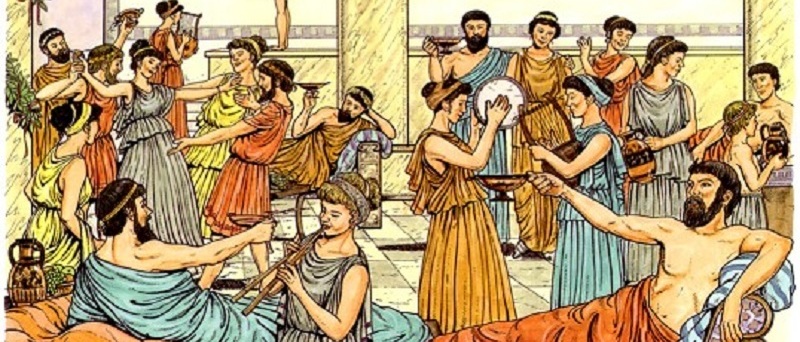Festivals in Athens
Posted on 25th December 2020
Festivals in Ancient Greece were to honour the Gods. Over one hundred days each year are believed to have been spent celebrating festivals.
Here I have listed a selection of them.
Panathenaea - The most important festival in Athens and the grandest in Ancient Greece; attended by everybody except for slaves, it was to honour the goddess Athena.
The procession would assemble before dawn at the Dipylon Gate in the northern sector of the city, led by Kanephoros (unmarried young women) from Ancient Greece. It was a privilege and a high honour to lead the Panathenaic festival.
Only Athenian citizens could pass through the Propylaea (monumental gateway) and enter the Acropolis. The procession would pass the Parthenon (temple) and stop at the great altar of Athena in front of the Erechtheum (temple). A peplos (ankle length female tunic), woven by Athenian craftswomen was presented to the statue of Athena. An animal sacrifice, cows and sheep, would then take place and the meat was eaten in celebration at the festival.
Every four years the Panathenaic Games was part of the festival. This was a series of athletic, equestrian, poetry and music competitions.
Dionysus - A religious festival in honour of the god Dionysus and the second most important festival to the Panathenaea. The main part of the festival was performances of tragedies or comedies held in the Theatre of Dionysus.
It consisted of two related festivals that took part at different times of the year; The Rural Dionysia and City Dionysia.
Lenaia - An annual festival with a dramatic competition; classed as a lesser festival in honour of Dionysus Lenaius.
Anthesteria - One of four Athenian festivals in honour of Dionysus, held in the January/February full moon; preceded by the Lenaia.
A wine drinking festival; a celebration of the maturing of wine stored from the previous vintage, including the opening of the wine containers.
Boedromia - A festival held in Athens in honour of Apollo; to thank Apollo for helping the Athenians during war.
Thargelia - An Athenian agricultural festival held in honour of Apollo and Artemis, including a purifying ceremony followed by a thanksgiving service. A ritual where two of the ugliest men that could be found, were chosen to die and then led to the place of sacrifice; they were stoned to death, burnt and their ashes thrown into the sea.
Adonia - A two-day festival in honour of Aphrodite and Adonis celebrated by women only. The first day, statues of Adonis were laid out as corpses on the streets and the women observed funeral rites including beating themselves and uttering lamentations for Adonis. The second day, a celebration and feasting, as Adonis was allowed to return to life; he was then allowed to spend half the year with Aphrodite.
Thesmophoria - A festival held in honour of Demeter and Persephone. A widespread festival to commemorate the third of the year when Demeter abstained from her role as Goddess of the Harvest and Growth. She mourned her daughter Persephone who had been abducted to the underworld by Hades. The main feature was the sacrifice of pigs.
Skira - A festival marking the dissolution of the old year. A procession from Athens to Skiron in which the priestess of Athena and the priest of Poseidon took part.
Hermaea - An animal festival in honour of Hermes including athletic contests.
Heracleia - A festival held in honour of Heracles and commemorating his death.
Amphidromia - A family festival celebrated on the fifth or seventh day after the birth of a child.
Tagged as: Junior Ancient Greece
Share this post:





